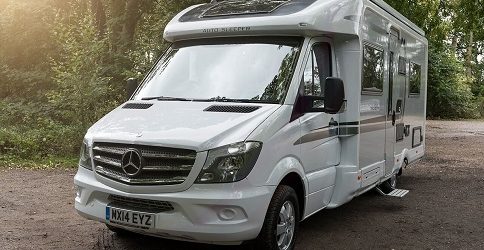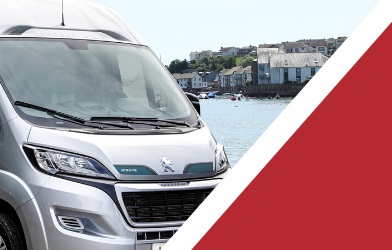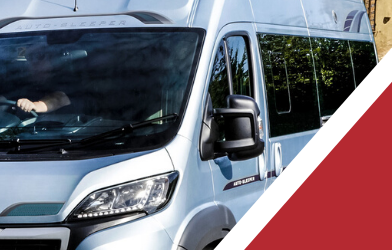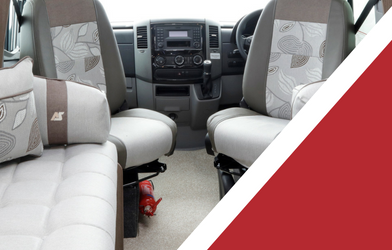There are many reasons why you may want to sell your motorhome – perhaps you discover that holidays in a motorhome are not for you; you want to upgrade to a newer or better motorhome; or, you might want to downsize to a vehicle that is more economical to run.
Sooner or later, most of us need to get to grips with the idea of selling a motorhome however much we may love it! While the demand for good used motorhomes is typically high, trying to sell your motorhome might not be a particularly major challenge.
Nevertheless, there are a few things to think about if you would like to sell yours sooner rather than later. So, whatever your reasons for selling, you might find the following tips and suggestions helpful.
Where to sell
So, you’ve decided that the time has come to sell your beloved motorhome. When you do so, you’ll naturally be looking for a sales channel that is offering you the most suitable deal given your overall situation at the time.
That’s why we’ve put together here a few general options that you might wish to consider further:
Advertising
- your aim is to let as many potential buyers as possible know that you want to sell your motorhome;
- of course, you are after the best price and want to describe it in as glowing colours as possible, but make sure that you do so as accurately as possible – remember that it is a criminal offence to sell any motor vehicle that is in an unroadworthy condition unless you make that fact crystal clear to any buyer;
- thinking about where you advertise and assuming you are not trading-in or selling to a dealership, make sure your advertisements are in a sensible place with respect to your target marketplace;
- for example, if you are upgrading from a campervan to a full-sized motorhome, you may find more customers online or in publications aimed at a slightly younger audience than in publications aimed at high net worth individuals;
- it’s a simplistic example but there are plenty of helpful articles on the internet about how to identify the right sorts of publications and websites based upon the thing you are trying to sell;
Online listings
- the good old days of paying for a notice in the classified ads section of your local newspaper or putting a card in the newsagent’s window have been overtaken by the numerous listings sites online – such as AutoTrader and Gumtree to name just two;
- clearly, the use of the internet considerably widens the scope of potential buyers – although the same rules on accuracy and roadworthiness continue to apply.
Private sales
Whether you advertise online or through more traditional sales, there are a few things to consider when selling your motorhome this way:
- check the identity of the buyers and their proposed method of payment. For example, identity theft might leave you exposed and the money you have received could be withdrawn from your account if your buyers are not who they said they are;
- some potential buyers may negotiate hard and aggressively which might make some sellers feel uncomfortable;
- deals and agreements to purchase in principle sometimes fall through at the last moment; and
- finding buyers can take time.
Selling to a dealer
You can, of course, simply take your motorhome into a specialist dealer and ask them for a valuation and cash price for it.
Providing you choose an established and reputable company such as ourselves here at Derby Motorhomes, this has the big attraction of having no identity theft issues and your payment should be secure and irrevocable – if you adopt common-sense practices.
As you might expect, the dealer will need to build in their profit margin for a resale and typically also the costs of a thorough examination of the vehicle, the rectification of any problems and a full professional valeting.
So, your pricing may need to be realistic in order to reflect these factors.
It’s worth bearing in mind too that not all dealers will necessarily wish to purchase your vehicle. A lot will depend upon their purchasing policies and their own existing on-site stock levels.
Part exchange
Part exchange is a popular and easy method of selling your motorhome in a context where you are looking to replace it.
This route normally implies that a dealer is involved and typically dealers may be in a position to offer you a rather better deal through part exchange than if they are making an outright cash purchase.
Just be sure that the price you are paying for your new motorhome and the cost allowance being allocated to your existing one, balance off in terms of realistic market values for each.
Brokers
Some individuals and companies offer intermediary brokerage services to people looking to sell their motorhome.
In principle, asking somebody else to sell your vehicle for you is fine. If they know of buyers looking for certain vehicles and you don’t, they may be able to offer a valuable service.
The things to consider here are as you might expect:
- be sure that the broker is a reputable organisation and not selling you short in terms of the price they are advising you to look for;
- in some cases, their advice as to realistically achievable prices might be influenced by the fact that they are looking for the fastest possible sales and biggest turnover; and
- in many cases, their services will invariably involve costs or a percentage of the final sale figure.
Preparing your motorhome for sale
Whether you are hoping for a private sale, selling to a dealer, looking for part exchange, or using a broker, it is important to show your motorhome to its best advantage. And that means spending some time on its preparation:
Visual appearance
- to show off your motorhome at its best, make sure to give it a thorough clean inside and out;
- for a motorhome, particular attention needs to be paid to the interior and making sure that you have cleared out all the rubbish, clutter, debris from the fridge and personal effects;
- motorhomes that look tired, that show exterior damage, or are simply dirty are likely to put off many potential buyers on a first photographic inspection – it’s particularly important that everything looks spick and span, internally and externally, before you invite people round for a viewing;
- if you are taking it to a professional dealer for trade-in or sale, first appearances may be slightly less important but they’re still a factor – but even the most hardened of dealers can be influenced, positively or negatively, by the initial impression of the outside of your motorhome and again when they take their first glance inside;
- so be prepared to invest a little time, effort and perhaps money in making sure that your motorhome looks attractive at the outset;
Be sure to correct faults
- it’s always poor sales psychology to be showing someone around your vehicle whilst at the same time going through a catalogue of things that are wrong with it – even if problems are relatively minor, buyers who spot them or who you describe them to can start to have doubts;
- there is a balance to be struck here of course. At Derby Motorhomes, we wouldn’t necessarily advocate spending a fortune trying to restore your motorhome to factory-delivery condition. However, it might be a very smart move to fix as many of those little niggles as is economically sensible;
Make sure it has been serviced and is running well
- unless you are selling your vehicle under the category of “requiring repair”, keep in mind that buyers will expect to see it running and riding reasonably well;
- if your servicing isn’t up to date, it might be worth investing a modest sum in a mechanical service before taking people for a test drive. Make sure there are no embarrassing rattles or shakes coming out of the engine that you have to somehow explain;
- since you want to impress upon any buyer that everything is in working order, check that the gas cylinder is full enough, fill the water tank and test the electrics;
- obviously, you need to ensure that the toilet cassette has been emptied and that the recommended chemicals have been added;
- your motorhome is designed to offer living space, so a critical part of preparation before selling it is a “habitation service”, a professional check of all the household elements;
- check that the greywater outlets drain properly, that all the locks are in good working order and, that any covers for the main services are in place;
- meticulous preparation may be less important in situations where you are offering your motorhome to a dealership as part of a trade-in or cash purchase – typically, they will normally attend to their own post-purchase full servicing and mechanical checks;
Documentation
- clearly, you need to have the logbook, or V5C, to hand so that any buyer may check the details against the vehicle itself – but beware anyone trying to copy or photograph it, since it might be the first step in stealing your identity;
- if your motorhome is more than three years old, you also need a valid MOT – consider getting it done well in advance of any advertisement, since anything close to a full year’s MOT goes down well, whereas one that has only weeks to go certainly does not.
Summary
Typically, good pre-used motorhomes are in high demand. You shouldn’t have too much difficulty in selling yours through any of the channels above but remember to be cautious in terms of protecting your financial interests.
This list of tips and suggestions may help to make the process of selling your motorhome more straight forward, but it may still seem like a daunting task.
In that case, you might want to let us take on all the hard work. So, don’t forget that here at Derby Motorhomes, we can buy your used Auto-Sleeper or any other motorhome and that we are also always interested in second-hand motorhomes to take in part exchange too.




